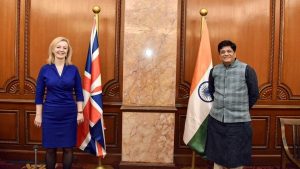
Imparting a fresh momentum to their economic partnership, India and the UK, strategic partners which boast a combined GDP of around $6 trillion, are set to launch negotiations for a free trade deal that has the potential to double bilateral trade to around $30 billion.
Formal negotiations for a proposed India-United Kingdom Free Trade Agreement (FTA) would begin on November 1, with an interim ‘early harvest’ agreement to be completed by March 2022, the Indian government announced in New Delhi on September 14.
In an attempt to step up the process for finalising the Free Trade Agreement, officials from India and the UK have launched the trade working groups to “lay the ground work” for this potentially transformative trade pact. The initiative aims at identifying potential areas of interest after a scrupulous evaluation of benefits for both sides and initiate an interim deal. The UK-India Enhanced Trade Partnership was signed in May 2021, that initiated the discussions along the lines of a Comprehensive Free Trade Agreement (FTA). The recent exchange between the concerned representatives of India and the UK hinted optimism despite some ground left to cover.
The interim trade pact would involve early tariff or market access concessions on certain key ‘high priority products and services,’ India’s Commerce and Industry Ministry said in a statement following Commerce Minister Piyush Goyal’s meeting with his British counterpart, International Trade Secretary Elizabeth Truss. In a Cabinet reshuffle on September 15, Ms Truss has been named as UK’s Foreign Secretary, replacing Dominic Raab.
India-UK bilateral trade amounted to $15.4 billion in 2019-2020. The FTA, when in place, is expected to double bilateral trade by 2030. The objective of an early harvest interim deal to be finalised by March 2022 is to work along similar lines through simplified custom duties and slackened data security laws. Several bilateral working groups (BWG) have been meeting to accelerate the process involving industry associations, expert councils, regulatory bodies, ministries and departments. The BWGs are expected to finish their work by September 2021. The interactions between the two countries for “joint scoping discussions” will begin on October 1, 2021.
The post-Brexit UK has been looking to cater to British businesses in terms of data, digital technology, food and drink. The UK British Business Council suggested that the FTA negotiations focus on reducing tariff on alcohol and medical devices, decreasing non-tariff barriers to goods trade by simplifying costly customs procedures, aligning procedures, ensuring tax parity between the UK and India businesses and securing mutual recognition of higher education. There were recommendations towards developing technology rich and digitally-driven industries. Almost 90% of the UK exports to India are Scotch whiskey. However, with the interim deal in place, British products like medical devices and agricultural products like apples, pears and quinces will gain access to Indian markets. The major Indian exports to UK comprise rice, tea, fruits, vegetables and prawns.
Contentious Areas
In the process of reaching an agreement, there are some points of contention that can cause delays. The Indian tariffs on British whiskey and automobiles are extremely high. The Economic Times reported that Britain is pushing for the removal of tariffs with a 150% levy on whiskey and 125% duty on imported cars. India, on the other hand, is hoping to achieve the “data secure nation” status to ensure easy access to cross border supply. That status will ensure flow of sensitive data in India and will facilitate its growth in data and analytics. Indian products like rice could get greater access to the British markets.
After the migration and mobility partnership signed between India and the UK, this deal will further expand economic cooperation. The UK also announced $1.2 billion package to support Indian public and private investments in the green projects and renewable energy. The proposed FTA is expected to open ‘extraordinary’ avenues and create many more jobs. Both the countries are looking to overcome the hurdles and reach a mutually beneficial agreement.
(Shubhra Chaturvedi contributed inputs for this article)
Author Profile
- India Writes Network (www.indiawrites.org) is an emerging think tank and a media-publishing company focused on international affairs & the India Story. Centre for Global India Insights is the research arm of India Writes Network. To subscribe to India and the World, write to editor@indiawrites.org. A venture of TGII Media Private Limited, a leading media, publishing and consultancy company, IWN has carved a niche for balanced and exhaustive reporting and analysis of international affairs. Eminent personalities, politicians, diplomats, authors, strategy gurus and news-makers have contributed to India Writes Network, as also “India and the World,” a magazine focused on global affairs.
Latest entries
 DiplomacyJanuary 5, 2026India walks diplomatic tightrope over US operation in Venezuela
DiplomacyJanuary 5, 2026India walks diplomatic tightrope over US operation in Venezuela India and the WorldNovember 26, 2025G20@20: Africa’s Moment – The Once and Future World Order
India and the WorldNovember 26, 2025G20@20: Africa’s Moment – The Once and Future World Order DiplomacyOctober 4, 2025UNGA Resolution 2758 Must Not Be Distorted, One-China Principle Brooks No Challenge
DiplomacyOctober 4, 2025UNGA Resolution 2758 Must Not Be Distorted, One-China Principle Brooks No Challenge India and the WorldJuly 26, 2025MPs, diplomats laud Operation Sindoor, call for national unity to combat Pakistan-sponsored terror
India and the WorldJuly 26, 2025MPs, diplomats laud Operation Sindoor, call for national unity to combat Pakistan-sponsored terror







